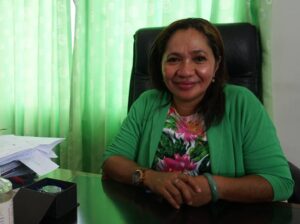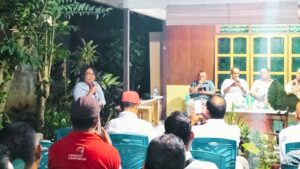
Election organizers (local election commissions) outside Java topped the list of complaints regarding neutrality issues during the 2020 regional head election process. Of the 270 regions that took part in the simultaneous regional elections at that time, organizers in North Sumatra are known most widely reported to the Honor Council Election (DKPP). There were at least 66 cases out of 415 complaints made by organizers throughout the area. Followed by the organizer from Papua with 44 complaints and South Sulawesi with 25 complaints.
Meanwhile, in the previous 2019 elections, the organizers in Papua were the organizers who received the most complaints with 75 complaints, then North Sumatra with 39 complaints and West Sumatra with 30 complaints.
This data was obtained by Jaring.id after processing various data from the DKPP and the Election Supervisory Body (Bawaslu) available at Datatalk.asia. The site which was developed collaboratively by the by the Jakarta-based Indonesian Association for Media Development (PPMN), the Association for Elections and Democracy (Perludem) with Sinar Project Malaysia and the Philippine Center for Investigative Journalism (PCIJ) contains open data on elections in Southeast Asia, in particular voter data, results and election violations in Malaysia, the Philippines and Indonesia.
The available data published in various formats easily processed, such as Comma Separated Values (CSV) and JavaScript Object Notation (Json). That way, users can directly analyze and convert the dataset into the form of infographics through the features that are already available in Datatalk.asia.
Based on the data processed by Jaring.id from the site, it is also known that the violation is in the form of neutrality of the state civil apparatus (ASN). In the 2020 election most common in Sulawesi. Of the 2,300 reports of alleged violations, about 282 complaints were filed against government employees. Meanwhile, allegations of abuse of the authority of regional officials and village officials are most prevalent in Papua and Maluku.
The conditions are different from what happened on the island of Java. If outside Java violations are committed by administrators and civil servants, then the cases of alleged election violations in Java are mostly carried out by election participants, namely among others candidates for legislative members, presidential candidates, political parties and campaign teams. Of the total 12,489 reports of alleged violations of the 2019 Election in Java, about 92 percent or the equivalent of 11,495 reports related to contestants.
Most Reported in 2019 Election
One case that was sticking out is when DKPP impose sanctions in the form of the dismissal of the three members of the District Polling Committee (PPK) in South Nias in 2020 ago. They are Hilimegai Paolianus Gulo, Amandraya Umbuzisokhi Giawa and Huruna Juferman. All three were proven to be still administrators at the local committee of the Democratic Party of Struggle (PDIP) of South Nias when they became Polling Committee. Meanwhile, five members of the South Nias KPU who were responsible for recruitment received a warning from DKPP because they were considered not neutral in the process of organizing ad hoc deployment.
“The complained one to five have committed fraud, are not neutral, unfair, and arbitrarily in selecting and determining the ranks of the polling committee,” reads an excerpt from the court verdict number 78-PKE-DKPP/VIII/2020.
In this case, the South Nias supervisory agency actually warned the commission election about the status of the three members of the polling committee through a letter of recommendation. In addition to their status as party members, the three of them are part of the campaign team of one of the running candidates for regent and deputy regent mates. However, at that time, the South Nias commission election did not implement the Supervisory agency recommendation.
Election researcher from the Jakarta-based Association for Elections and Democracy (Perludem), Heroik Pratama said that there are at least two factors that cause organizer or civil servant who is susceptible involved in election violations. The first is the area of the electoral district and the open proportional electoral system. The system which has been effective since 2009 uses a majority of votes to determine candidates for legislators who sit in parliament.
Research from the Institute for Economic and Community Research at the University of Indonesia (LPEM UI) shows that the implementation of an open proportional system creates raises political costs. The spending for legislative candidates in the 2014 legislative election, for example, ranged from IDR 1.18 billion to IDR 4.6 billion. While regional parliament spends an average of IDR 481 million to IDR 1.55 billion.
With the all cost of the campaign, according to Heroik, the candidates are trying to get votes by looking for shortcuts through influential people, including election organizers and local governments. “Both of them could have an effect so it is necessary to seen how the constituency and the number of candidates in each region,” said Heroik when contacted on Monday, July 12th, 2022.
In research entitled Election Malpractice and Corruption in Indonesia: Analysis of the Calculation and Recapitulation Process in the 2019 Election, published in the Integrity Journal of the Corruption Eradication Commission (KPK), shows that most ethical violations committed by organizers occur at the vote counting and recapitulation stages. Meanwhile, most of the complaints occurred at the recapitulation stage at the sub-district level. By doing so, the organizers of the vote recapitulation at the sub-district level are more prone to electoral malpractice.
“Two conditions are needed for election malpractice at the sub-district level, the desire of party witnesses who want to change the vote acquisition and the approval of polling committee or sub-district committee who conspired with the sub-district supervisory committee,” said Heroik.
Therefore, Heroik suggested that the General Elections Commission immediately use the electronic recapitulation system (e-recap) in order to minimize election fraud. Until now, the utilization of digital technology has not been able to be implemented because it is hindered by regulations. “But don’t let the use of technology block people’s access to oversee the vote recapitulation,” he said.
Reported Alleged Violation of Election 2019
Meanwhile, members of the honor council, Didik Supriyanto assess that there are still a number of high violations committed by the organizers in a number of areas is the impact of the electoral system which involves the Commission II of the House of Representatives (Parliament). In this process, the party that has great influence to determine who the members of Bawaslu selected. This, according to Didik, is not in accordance with the status of the election organizer’s independent and sovereign institutions as stated in the Election Law. “It’s kind of a thank you for choosing me, the selection team selected will represent certain groups, including political party affiliation,” said Didik when contacted on Monday, July 12th, 2021.
In addition, the lack of public oversight of the electoral process in the area also affects the offense. In fact, citizen participation in supervising elections is very important. “The existence of supervisors formed by the organizers actually makes parties and the public think that supervision is only the task of the official supervisory agency, not the task of the wider community. This condition makes a lack of violations reports from the community” he said.
In line with Didik, the Director of Politics and General Administration of the Ministry of Home Affairs, Bahtiar said that the current election monitoring mechanism had not been effective. Neither the organizers nor the government have adequate human and budgetary resources to carry out supervision. This has an impact on the repeated violations of election to election. “The public must be given education voters to participate oversee the running of the election and how to choose a candidate not because of money or their lure,” said Bahtiar.
In terms of violating the neutrality of civil servants and regional officials, Bahtiar assesses that many rules have been made as ethical guidelines for officials and civil servants. However, according to him, government officials who are proven to have violated ethics in elections cannot be punished immediately. In ethical violations, the Ethics Committee’s decision only reaches the stage of providing sanctions recommendations. Meanwhile, the execution of these recommendations is highly dependent on the wishes of the regional head. “In fact, even sometimes it is not uncommon the heads of services offices are threatened with their positions or exiled if they are deemed not to have contributed to winning the regional head or deputy’s head,” he said.
Bahtiar hopes that various election violations, whether committed by organizers, contestants, or civil servants, will not be repeated in the upcoming 2024 general election. By utilizing previous election data, organizers should be able to minimize similar violations. “In order not to repeat (violations) there are still many things we can do towards 2024, such as voter education, supervisor education, administration education. Then educate the public to oversee the voting and vote intelligently. It was heavy work to be done by all parties, “he concluded.







